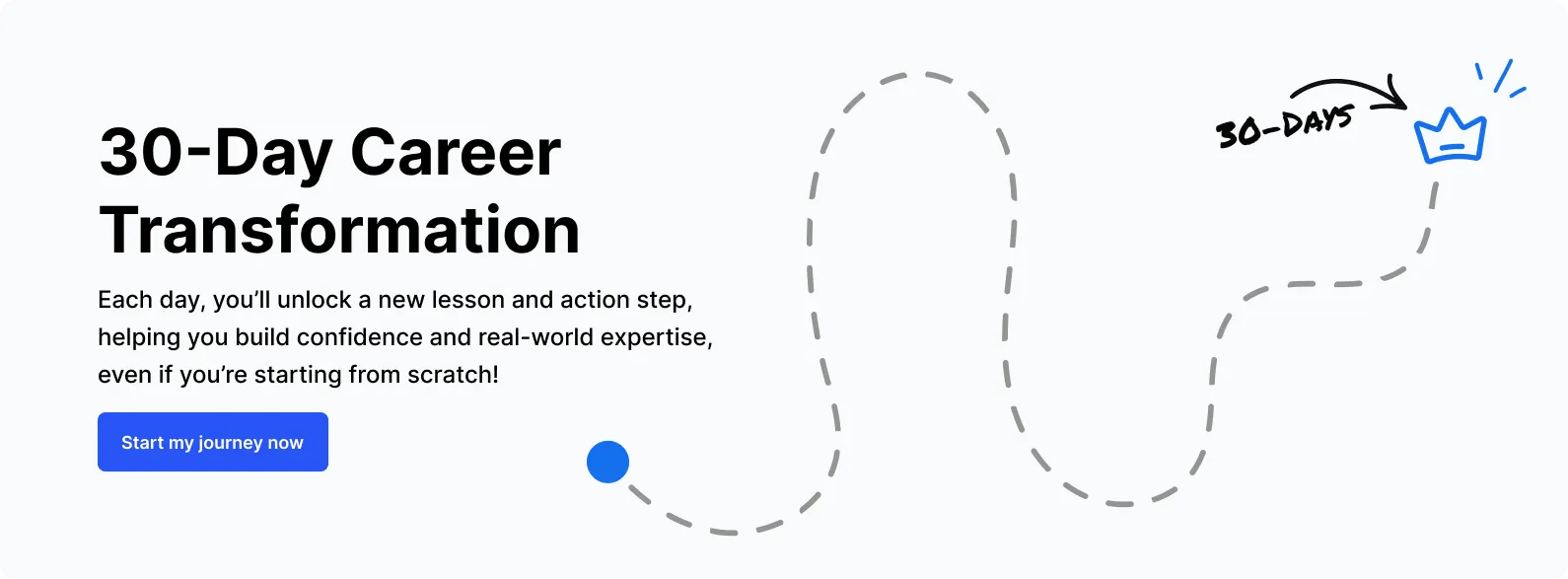6 Steps to Build Confidence for a Successful Career Change
Feeling stuck in your job? It’s never too late to change careers. Learn 6 steps to build confidence and successfully transition to a new, fulfilling path.
Table of contents

Feeling stuck in your job? It’s never too late to change careers. Learn 6 steps to build confidence and successfully transition to a new, fulfilling path.
Feeling stuck in your current job or job insecurity can be daunting, especially when you're around 40 and wondering if it's too late to change.
Building the confidence to take that leap isn't about ignoring your fears; it's about confronting them and realizing that you have valuable skills and experiences to offer. You might be at a point where digital and AI advancements seem like threats, but they can be opportunities in disguise.
This guide'll provide practical steps to help you regain your self-assurance and take charge of your career journey.
Making a successful career change isn’t about taking a giant leap overnight; it’s about taking steady, intentional steps that help you build your confidence and navigate the transition with clarity.
These six steps will guide you through each stage, empowering you to embrace your potential.
Before diving into a career change, you must revisit your priorities and truly understand why you want this shift. Is it about finding job satisfaction, gaining financial stability, or seeking personal growth?
As George Velasco’s story reminds us, life doesn’t always go as planned. He once had his goals perfectly mapped out – a promising career in Information Technology backed by military service and an impressive academic track record.
But one night changed everything when he suffered a traumatic brain injury during a robbery. George shared,
“It’s so peculiar because when they asked me to set my goal, it was to be able to stand up from a chair without any help…goals do change with life’s situations.”
This journey teaches us that goals must be flexible and align with our values. We must adapt as life unfolds. Setting smaller, achievable goals helps build momentum, giving you the confidence to move forward, even when facing unexpected challenges.
As you map out your career pivot, consider your immediate needs and where you envision yourself in the future – and be prepared for those goals to shift over time.
Key Actionable Takeaways:

You already have what it takes to make a career change – it’s all about tapping into the skills and experience you’ve gained over the years. As career development coach Hanane A. emphasizes,
"You don’t need more qualifications just to make a change. You are already valuable, and you already have got what it takes."
Many people believe that a career shift requires going back to school, but that's not always the case. Unless you’re aiming for a role that demands specific credentials, like a doctor or dentist, you can leverage the expertise you already possess.
Hanane’s journey proves this. In 2014, she moved into Learning & Development without obtaining additional qualifications, relying instead on the skills she’d already developed.
Start by identifying your transferable skills – those abilities you’ve honed over years of work, like communication, leadership, or problem-solving. Highlight the relevant experience you've gained and use it as the foundation for your new path.
Moreover, practice and refine these skills through real-world applications.
Key Actionable Takeaways:

Elevating your skills is essential for building the confidence you need to navigate a career change. Self-confident individuals believe they possess the qualities, skills, and intelligence necessary for success, even in challenging situations. As the Indeed team suggests,
"Self-confident people... often face their fears and are likely to pursue challenges and goals, no matter how difficult they seem."
To enhance your self-assurance, consider engaging in continuous learning and professional development. Attend training sessions that focus on skills crucial to your job.
Additionally, you may also consider pursuing tech certifications without learning coding through No-Code Institute that aligns with your career goals; these credentials can set you apart in a competitive job market.
Finally, join webinars, workshops, and networking events relevant to your field. These opportunities will expand your knowledge and connect you with others who share your ambitions, reinforcing your confidence as you learn and grow together.
Embracing these strategies will empower you to take your skills to the next level and tackle your career challenges head-on.
Key Actionable Takeaways:

Building a successful career change is often about who you know, not just what you know. Professional networking is crucial for career growth, even if the thought of it seems daunting.
Self-confident people, as Michael Page, a recruitment services provider, highlights,
“Many shudder when they hear the term networking… However, networking is about more than just self-promotion; it’s about forming genuine, mutually beneficial relationships.”
Start by reconnecting with former colleagues and mentors. These individuals already know your work ethic and can offer valuable advice or even introduce you to new opportunities.
Expanding your network through LinkedIn and industry events also plays a vital role. Engaging in online communities or attending conferences can connect you with professionals in your desired field.
Remember, the right connections can lead to hidden job opportunities, fresh perspectives, and invaluable career guidance.
The more you connect, the more confident you’ll feel about your career pivot, knowing that you have a strong support system.
Key Actionable Takeaways:

To pivot your career successfully, you need to start with a well-defined strategy.
As the Indeed team states a wise note,
"Confidence can make you more motivated and ambitious, less anxious and stressed and having a well-thought-out strategy is a key part of this process.”
This self-assured mindset is essential for a career change and is built through thorough preparation and planning.
Start by researching your target industry and job market. Understand the trends, demands, and skills required so you know exactly what’s expected. This knowledge will empower you to tailor your resume and cover letter for specific roles.
Remember, each application should reflect that you’ve done your homework.
Next, create a step-by-step action plan for your career pivot. This plan should include short-term and long-term goals and detail the actions you need to take.
Whether it’s enrolling in additional training, expanding your professional network, or polishing your LinkedIn profile, having a roadmap will keep you focused and confident.
As you tick off each step, your belief in your ability to succeed will grow, motivating you to face challenges head-on and pursue your career pivot with clarity and assurance.
Key Actionable Takeaways:

When it comes to reinventing your career, building resilience is the key. It’s easy to make excuses like “I’m too old,” “I can’t afford it,” or “I won’t make a success of it.”
But as career management coach Katherine Wiid points out,
“It’s safer to stay in the same groove, sticking to the same old stories we tell about ourselves. However, to make a successful career pivot, you need to shift your mindset and become open to new possibilities.”
Start by practicing mindfulness or meditation to handle stress. This helps you stay calm and focused, especially when facing uncertainty.
Developing a positive mindset toward challenges is equally important. Remember that setbacks are part of the journey—they’re not roadblocks but learning opportunities.
As Katherine Wiid suggests, take inspiration from Clare's story. After 20 years in a tech job she hated, she took small steps to reinvent herself, eventually becoming a senior horticulturist.
Lastly, ambition should be balanced with realistic goal setting. Break down your career change into manageable steps, and celebrate each win along the way.
Just like Clare, you’ll find that taking one step at a time helps you stay on track, building your confidence and resilience as you move closer to your new career.
Key Actionable Takeaways:

Embracing a career pivot can lead to significant personal and professional growth. It is crucial to assess the benefits of this change, such as enhanced job satisfaction and increased earning potential. Ensure that your new path aligns with your long-term values and priorities, allowing you to pursue a fulfilling career that resonates with your true self.
Remember, obstacles are part of the journey, but they can be overcome with resilience and a positive mindset.
At NoCode Institute, we empower individuals like you to develop valuable no-code skills that can open doors to new career opportunities. Our programs are designed to support your transition, providing the tools and knowledge you need to succeed in today’s digital economy.
Take the first step towards your career fulfillment today and explore our offerings to help you confidently navigate your career change.

Looking to re-invent yourself and turn your talent into a career? Stay up to date with the latest.